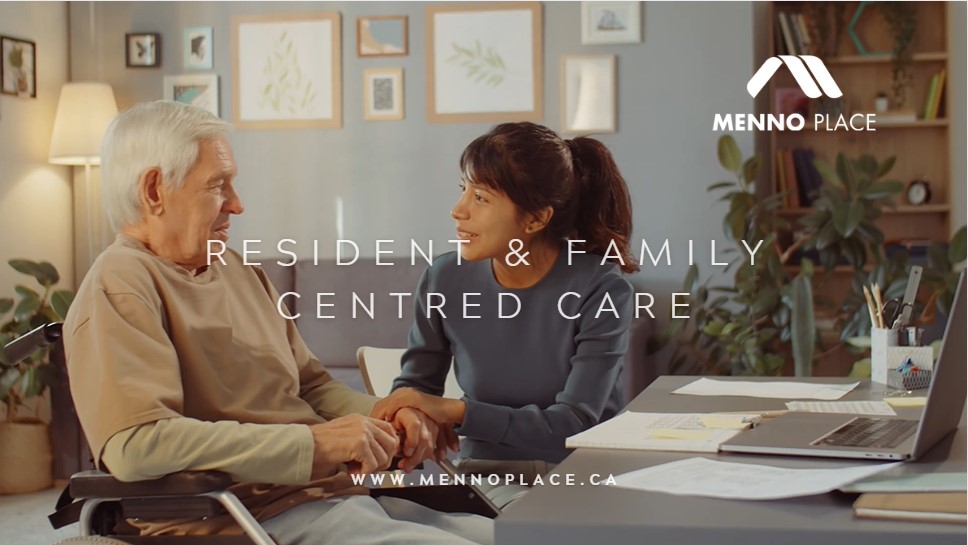IF IT
MATTERS
TO YOU
IT MATTERS
TO ME
Menno Place has adopted the following definition of Resident and Family Centered Care:
Resident and family-centred care at Menno Place starts with asking our residents and their families, “What matters to you?”. We commit to respectful engagement, collaboration and communication so we can support each resident in achieving their best days possible.
Our values – Stewardship, Excellence, Respect, Values Sanctity of Life, Innovation, Compassion, Encouragement – align with RFCC which makes this philosophy concept a good fit for Menno Place.
Resident and Family Centred Care
Since 1953, Menno Place has been caring for seniors with compassionate Christian care. Over the years there have been many changes in how our society cares for the elderly. In 1954, at the beginning of Menno Home care, the average age of an elderly resident was 64 years old! Most of the residents were able to drive their own car, collect eggs, garden vegetables and milk the dairy cows.
As we understand the psychological, spiritual, emotional and physical needs of each senior, our philosophy of care has shifted from primarily focusing on the medical needs of a resident to a Resident and Family Centred Care (RFCC) plan for each individual.
Menno Place has adopted the following definition of Resident and Family Centred Care:
Resident and Family Centred Care at Menno Place starts with asking our residents and their families, “What matters to you?”. We commit to respectful engagement, collaboration and communication so we can support each resident in achieving their best days possible.
The Four Core Concepts that support RFCC include:
- Dignity and respect: Listening to and honouring resident and family perspectives and choices. Resident and family knowledge, values, beliefs, and cultural backgrounds are incorporated into the planning and delivery of care.
- Information sharing: communicating and sharing complete and unbiased information with residents and families in ways that are affirming and useful. Residents and families receive timely, complete, and accurate information in order to effectively participate in care and decision-making.
- Partnership and participation: encouraging and supporting residents and families to participate in care and decision making to the extent that they wish.
- Collaboration: Collaborating with residents and families in policy and program development, implementation and evaluation, facility design, professional education, and delivery of care. (Accreditation Canada)
The RFCC philosophy focuses on the individual rather than on the condition, and on the person’s strengths and abilities rather than losses.
- At Menno Place staff members respect the wishes, concerns, values, priorities, perspectives and strengths of the person and family. The value for human dignity is shown by caring for residents as whole and unique human beings, not as problems or diagnoses. To support the individual’s personhood, the team provides RFCC with a focus on the person and the relationship; not the disease.
-
What does RFCC look like in real life?
- Speaking to the resident respectfully:
- use the name the resident prefers
- Engaging in social conversation, as appropriate, about events and experiences in the person’s life:
- create memory boxes
- family pictures
- items from home in their room
- Offering choices about how to accomplish the task:
- Style of dress, makeup (does a woman who always wore makeup feel un-presentable without it?)
- Greeting and expressing interest in the resident’s welfare, comfort, condition:
- Knock before entering the resident’s room
- Introduce yourself – “Hi, my name is……”
- When I leave the resident’s room I ask – “Do you need help to the bathroom? Do you need something for pain? Are there any personal items you need within reach before I leave?”
- Finding out what makes the resident’s life meaningful when making decisions about their care:
- Together with the resident and family create and honor their goals of care
- Individualized activities that connect to the resident’s previous interests (can a gardener enjoy looking at a seed catalogue if he or she can no longer physically plant seeds?)
- Speaking to the resident respectfully:






